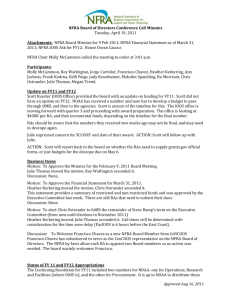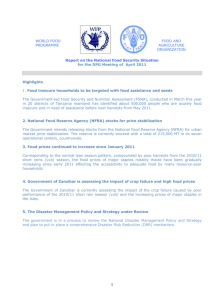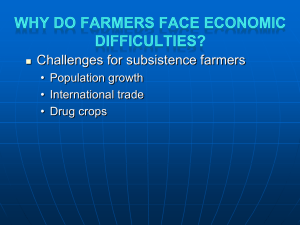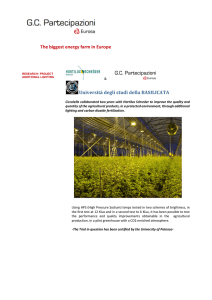NFRA BACKGROUND
advertisement
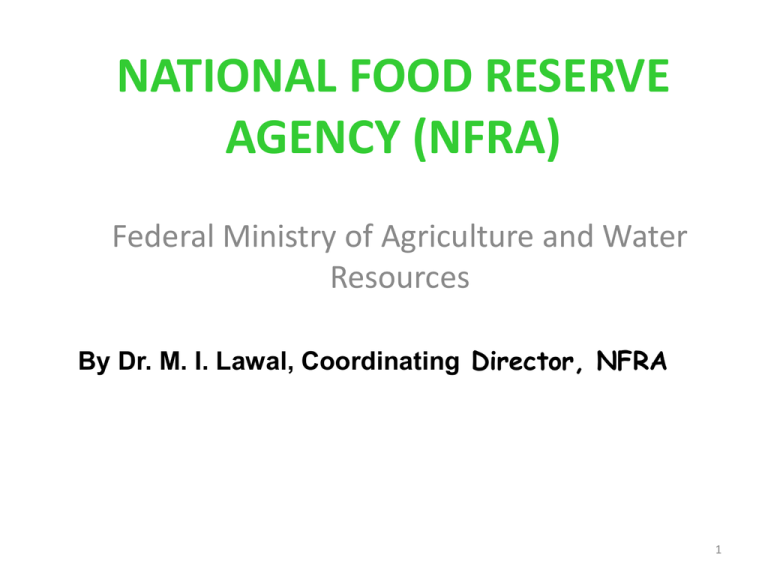
NATIONAL FOOD RESERVE AGENCY (NFRA) Federal Ministry of Agriculture and Water Resources By Dr. M. I. Lawal, Coordinating Director, NFRA 1 Silo Complex 2 NFRA BACKGROUND • The National Food Reserve Agency (NFRA) is a Parastatal of the Federal Ministry of Agriculture & Water Resources (FMAWR). • NFRA was set up to address key issues and constraints relating to agricultural production, processing, storage and marketing. • NFRA emanated from the merger of the following former departments/divisions of the FMAWR: – – – – Projects Coordinating Unit (PCU), Strategic Grains Reserve (SGR), Fertilizer department, Cooperatives department, and FDA’s Engineering / Mechanization and Post -Harvest Technology divisions. 3 NFRA VISION • To ensure sustainable access, availability and affordability of quality food to all Nigerians and for Nigeria to become a significant net provider of food to the global community 4 NFRA MISSION • In the short term, to significantly improve Nigeria’s agricultural productivity; • In the medium term, to expand and improve large scale production, storage/processing capacity as well as required infrastructure to achieve food stability; • In the long term, to achieve national food sufficiency and derive over 50% of the nation’s foreign exchange through agricultural export. 5 6 NFRA Management Structure • Presently, the Acting Executive Officer of the Agency is a Coordinating Director, who reports to the Honourable Minister of Agriculture & Water Resources through the Permanent Secretary. • The six Departments of the Agency are: - Food Reserve & Storage (FRS); - Agro-Processing & Marketing (APM); - International Collaboration & Partnership (ICP); - Agric Production & Inputs Services (APIS); - Cooperatives Development; - Finance & Accounts; and - Administration. • The Agency’s operations are decentralised with Regional Offices in each geo-political zone. The Regional offices have closer linkage with the states, Local Governments and the farmers. 7 Functions of the Food Reserve & Storage Dept • Operating the strategic food reserve stock • Establishment, operation and maintenance of storage facilities • Operating the Guaranteed Minimum Price (GMP) mechanism • Management and distribution of food commodities 8 9 10 11 12 Functions of the Agro-Processing & Marketing Dept • Development of cottage industries • Development of agro-industrial parks • Development of value-added products and market for agricultural produce • Development & management of export conditioning and processing centres in partnership with the private sector • Operation of quality control services to ensure compliance with international export standards 13 Functions of the International Collaboration & Partnership Dept • Collaborating with national and international agencies in implementing projects for Nigeria’s agricultural development • Coordinating the projects sponsored by donors (World Bank, AfDB, IsDB, FAO, etc) to ensure household and national food security, poverty alleviation and livelihood improvement in Nigeria • Providing planning, monitoring & evaluation support for efficient and effective implementation of the donor projects as well as the home grown National Programme for Food Security (NPFS). • Facilitation of linkage between farmers, State ADPs and agricultural research and training institutions. 14 Functions of the APIS Dept: Fertilizer Services • Fertilizer quality control & regulation to foster growth in the sub-sector • Support of fertilizer specific extension packages • Providing national/international fertilizer market data and information • Linkage with private sector fertilizer plant investors and encouragement of local blending plants 15 Functions of the APIS Dept: Tractorization • Facilitating farm mechanisation by assisting farmers to have access to tractors and other farm machinery through Public Private Partnership (PPP) arrangements • Supporting extension packages on agricultural mechanization 16 17 18 19 20 Functions of the Finance & Accounts Dept • • • • Operating the Agency’s annual budget Management of assets and inventories Preparation of final accounts Carrying out general financial management of the Agency 21 Functions of the Administration Dept • Carrying out personnel management and general services functions • Taking charge of training and human resources development of the Agency • Development of staff welfare 22 NFRA ACHIEVEMENTS IN 2009 • 63,859.27mt of assorted grains were procured out of the 124,000mt targeted (51.5% achievement). • Contract s for procurement of additional 170,000mt of assorted commodities awarded and supplies in progress • 25,000mt of assorted food commodities were distributed • 612 unemployed youths were trained and have completed their internship on various enterprises including poultry production, crop/ honey production and agro-processing. • The construction of 75 units of 2,000mt -capacity community warehouses 48 units have been completed. 23 NFRA ACHIEVEMENTS IN 2009 CONT’D • 11No existing silo complexes including the plants and ancillary equipment were maintained. • Construction of 20 additional silo complexes were commenced nation wide during the year. • The establishment of two agro-processing estates in the country is in progress. • Work is progressing in the nationwide establishment of 17No rice processing mills of 40mt capacity each. • Investors were selected and mobilized for the establishment of 6No export crop handling, preservation and conditioning centres nationwide. 24 NFRA ACHIEVEMENTS IN 2009 CONT’D • The FMAWR through NFRA promoted the use of certified seeds by farmers in order to improve productivity. In the 2009 cropping season, over 1,300mt of certified seeds of rice, maize, sorghum, millet, cowpea, soyabean and beniseed were supplied by accredited seed companies to the 37 ADPs and sold to farmers at 50% subsidy. • 5No Agricultural Seed Centres were established under the build, operate and own (BOO) model of public private partnership (PPP) initiative. 25 NFRA ACHIEVEMENTS IN 2009 CONT’D • Agricultural Production Survey results by the State ADPs were compiled and published by the agency. • The results of the surveys conducted by the State ADPs and analysed by the Agency in 2009 indicated that in 2008, the land area cultivated to cassava by small holder farmers increased by about 10 percent when compared to the 3.26million hectares in 2007. However, the yields of most crops by the small holder farmers did not increase appreciably when compared with that of the preceding years. • Also, on commodity market prices, the differences in the market prices of most commodities between 2008 and 2009 were generally not more than 20%. 26 NFRA ACHIEVEMENTS IN 2009 CONT’D • Under the tractorisation programme, the FGN subsidizes the cost of a tractor to the tune of 25%; State government 15%; and the beneficiaries 60%. • Contracts for the supply 2,600 units of tractors and implements was awarded in 2009 • 692 units of tractors and implements delivered. 27 CHALLENGES • Inadequate office accommodation adversely affected staff productivity • Delay in the passage of the bill setting up the Agency by the National Assembly adversely affected staff morale and productivity 28 CONCLUSION NFRA activities are generally focused on hunger and poverty reduction in line with the MDG and government objectives/policy thrusts related to wealth creation, healthy livelihood of the Nigerian citizenry and youth employment, among others. The Agency is determined to do more in addressing the full value chain approach to induce the competitiveness of the agricultural sector in Nigeria. In order to improve on the achievements recorded so far, funds should be released on time to enhance prompt execution of the planned activities/ projects. 29 THANK YOU! 30
